- Home
- Jane Peart
Shadow Bride Page 6
Shadow Bride Read online
Page 6
His hand on the doorknob, Rod debated the wisdom of what he was about to do and hesitated. Then, deciding that having come this far he could not turn back now, he twisted the knob and went inside.
In the dingy office a man, seated behind a desk, looked up over small, square spectacles punctuating his sallow, moon-shaped face. Sparse strands of hair were combed precisely over his balding head.
He squinted curiously at Rod. “Yes, sir, may I help you?”
Rod felt an instinctive revulsion. As if his errand were not questionable enough, it seemed he must solicit the help of a man whose very appearance was reminiscent of a pulp novel.
“Mr. Burnham? Mr. Philip Burnham?”
“The same, sir.”
“I’m Rod Cameron. We’ve had some correspondence and—”
The man nodded and replied in an oily voice, “Quite so, quite so. I have your letter here someplace. Do have a seat, sir, until I locate it—” Burnham rummaged through a sheaf of papers cluttering his desk while Rod sat down stiffly in a chair opposite.
“Ah, yes, here it is.” Mr. Burnham retrieved a dog-eared folder from the pile that threatened at any moment to topple over. “I see you’re looking for someone you have reason to believe is in England. Am I right?”
Almost before Rod had finished giving a brief description of Blythe and his reasons for extending his search for her to England, the man was shaking his head.
“Mr. Cameron, the trail for this young lady is nearly five years old. You do understand that it has cooled off considerably by now. People trying to lose themselves usually move very fast, covering their tracks the first few months when it might be easiest to catch up with them.”
“I didn’t say she was trying to—” protested Rod, but the man ignored the interruption and resumed his lecture.
“Besides, you’ve given me very little to go on. A physical description is usually of little use, especially in finding a woman determined not to be found. Women can do all sorts of things to change their appearance—dye their hair, pad themselves to look heavier, wear a different style dress, affect an entirely new manner—It’s surprising what good actresses the ladies can become.”
Mr. Burnham’s eyes took on a gleam of admiration. “I recall a Miss Tillie Murgesson, a real ‘stunner,’ she was, too. A shopgirl who had cleverly absconded with the store’s entire monthly payroll and—”
Rod stirred impatiently, and Mr. Burnham adjusted his eyeglasses and returned to the papers in his folder. Drawing out a letter Rod recognized as the one he had written just a few weeks ago, the man cleared his throat. “Now was this … Mrs. Blythe Montrose … an employee? Someone you suspect of taking the family silver, or perhaps her mistress’s jewelry or—” Here Mr. Burnham looked up, eyeing Rod across the desk with a certain sly look. “Or does she have some letters in her possession, perhaps written in the indiscretion of infatuation, that you now wish returned?”
Rod felt a rising fury he could barely restrain. “I don’t think I’ve made myself clear, Mr. Burnham. I am not trying to trap anyone. I simply want to know if this … this young lady is well.” Rod’s voice took on a firm authority that Mr. Burnham was quick to acknowledge.
He hastily put down the letter he was reading and brought out a legal pad, making scribbled notes as Rod dictated.
“Let’s go over the description once more then, sir. Approximately five feet seven … hmm, tall for a lady, isn’t she? Red hair—oh yes, dark auburn, you say. Color of eyes?” He wrote rapidly, his pen noisily scratching across the sheet of paper. “What sort of occupation might this lady now be employed in, do you suppose? Domestic service, clerk, waitress?”
This question gave Rod pause. He could not think of a possible answer. What would Blythe do, alone, without money, friends or family, in a strange country? Maybe his mother was right. After all, why would Blythe have left America? Still, all the leads Rod had followed so far had led nowhere. The one most promising had suggested that Blythe took the train from Mayfield to Richmond and on to Washington. From there, the only reasonable direction would be to go north to a big city like New York or Boston. Why? But, then, that was still the most puzzling, unanswerable question of all. Why, indeed?
When the Camerons had found out about Montclair and learned that Blythe was gone, they had discussed every possibility. It seemed to Rod, after his fruitless efforts to locate her in California, that she must have stayed in the east. Left penniless by Malcolm’s profligate gambling, where would she go, what would she do with limited formal education and no work experience? Seek work as a housemaid or children’s nurse? Rod had never known a woman who had to support herself. His mind had drawn a blank then, nor had he been able to offer Mr. Burnham a satisfactory suggestion.
At length, he left the office feeling as frustrated as before. He also felt a little degraded for having discussed Blythe with that man who was probably more accustomed to dealing with the lowest types of criminals and evaders of the law. As distasteful as it had been, Rod’s determination to leave no stone unturned in his search for Blythe was stronger than ever. If this character could come up with any helpful information, it would have been worth it.
Rod now pounded his fist on the ship’s railing. Where was she? And if he couldn’t find her, why couldn’t he forget her?
He shivered in the swirl of mist and fog now encircling the open deck. Turning up his coat collar, he went below to the small, cramped cabin where he spent a restless night in a narrow berth too short for his long legs and awoke, sore and exhausted, to the sound of ship horns announcing their arrival in Dublin harbor. He was in Ireland at last.
Dan McShane was there on the dock to greet Rod with a wide smile and a hearty handshake. When he took Rod over to his fine polished carriage drawn by two prancing black horses, a freckle-faced, rosy-cheeked boy of about twelve was sitting in the driver’s seat, proudly holding the reins.
“This is Sean, my oldest,” Dan introduced him. “I let him take off the day from school to help me greet our American guest.”
The road from the docks wound through the city and out into the countryside. Rod was struck by the variegated shades of green so brilliant that the landscape seemed to shimmer in an iridescent mist. They passed through a village of thatch-roofed, white-washed cottages, scattering barefooted children and squawking chickens in their wake. Friendly villagers waved as the carriage rolled by, and Dan shouted his own lusty greeting.
Off the main road, a narrow lane threaded its way between undulating pastureland. Here Rod first glimpsed the herds of fine horses from Dan’s stables. Good horseflesh!
His excitement mounted as at last they drew up in front of a gray stone house, its entrance bright with flowers.
Dan tossed the reins to Sean. ‘Take the horses down to the stables for a good rubdown, there’s a good lad.” To Rod, he said, “Come along and meet my better half.” He grinned broadly.
As they got down from the carriage, the top half of a polished oak door swung open, and a handsome woman with dark wavy hair and blue, laughing eyes beckoned them inside.
“Welcome, Mr. Cameron! I’m Maura.” She unlatched the full door and held it open. “And would you be ready now for a good Irish breakfast? The girls and I are just getting it on the table.”
A few minutes later Rod was sitting at the broad table in the sunny dining room. There were slices of succulent pink ham, mounds of fluffy eggs, yellow butter, potatoes cut thick and browned lightly, fresh-baked oat bread, and steaming hot sweet tea. He ate with an appetite fueled not only by the abundant food, but by the warmth of the good people in the home.
That was the first day of his week-long visit to the McShane farm, each day thereafter a pure pleasure. Their hospitality rivaled the legendary Southern hospitality with which Rod had grown up.
The McShanes’ four children, three boys and a pretty little girl, were as friendly as their parents and rode their own ponies like veterans. Maura McShane, a real “stunner,” as Mr. Burnham might have d
escribed her, was obviously in love with her big, rugged husband, who adored her unashamedly.
It was an environment that both charmed and saddened Rod. He could not deny a twinge of envy as he observed their happiness, the contentment of their life together. It made his own solitary status, his unfulfilled dreams, his loneliness, even more acutely unbearable.
Rod spent the first part of his stay looking over Dan’s stock, selecting the brood mares he planned to buy to enhance his own stables at Cameron Hall. In frequent consultation with Dan about his distinctive techniques of horse-training, Rod took note of the subtle differences in training technique that Dan used for riding from those he used for raising hunters.
By the end of the week, Rod had acquired a tremendous respect for Dan—his knowledge, his way with the animals, his expertise—and accompanied him to the lawyer to sign the bill of sale for the horses Rod was arranging to ship back to Virginia.
Just before he was to leave for England and his visit with Garnet, Rod told the McShanes good -bye to do a little exploring on his own. Taking a room at an inn near Dublin, he set off one fine, misty morning for a long hike.
A few miles from the village, he had been told, was the site of an ancient abbey situated on the cliffs high above the ocean. It was here Rod sat on a flat, sun-warmed rock to eat the lunch the innkeeper had packed in his haversack.
While he munched on ham and cheese between thick slices of homemade bread, Rod contemplated the magnificent view—emerald green Irish hills against a cerulean sky, the golden sands below, the turquoise water dancing with white crests of foam.
So far from home and all that was familiar, Rod experienced a strange melancholy. His eyes roved the glorious landscape, its wild grandeur and haunting beauty. That there was no one to share this splendid moment, no human heart to understand his mood and echo his sentiments was overwhelmingly oppressive.
He finished his lunch, stood up and walked a few yards farther toward the abandoned abbey. He had been told it had been built in 1062, supposedly one of the finest examples of ecclesiastical architecture in which early Irish Christians worshiped. Later, it was destroyed by Cromwell’s men and finally gutted by fire, its treasures stolen. Now all that remained was a rubble of stone, part of a wall and arch.
Rod stepped among the ruins, wondering what this structure, built to the glory of God, must once have been like. Beyond the nave, now open to the sky, were the remnants of a graveyard with a few granite Celtic crosses and broken headstones. Rod strolled through the scattered stones of the church out onto the coarse tufted grass and wandered through the burial plots.
Most of the epitaphs were nearly undecipherable, probably carved in old Gaelic. But as he continued to wander among them, the inscription on one caught Rod’s attention, and he stopped to read it.
“Eileen of my heart, Eileen of my love, ere the world should end my love for you remains ever”—Aidian Wyre, 1640”
What stonecutter, having lost his beloved, had composed this heartrending promise? Whoever he was, Rod felt instant empathy with him.
From that ancient graveyard he walked slowly back over hillocks studded with wind-sculpted yew trees, then down along a sparkling clear stream. As he turned toward the village back to his room at the inn, Rod came to a decision.
He could not spend the rest of his life mourning something irretrievably lost, something that, for all his searching, he had not been able to find. Life was not meant to be empty and meaningless. Life was meant to be shared; love, to be given; the future, to be anticipated.
The words of a proverb came to mind: “Hope deferred maketh the heart sick.” Well he was heartsick, all right, tired of hoping for what appeared to be hopeless, tired of the emptiness of his life. He longed for fulfillment, for love, and the promise of happiness.
He would be leaving for England in the morning. There he planned to visit Garnet and Jeremy at their country house before sailing for America and back to Virginia.
But first, he decided, he would stop in London and call on Fenelle Maynard, who was staying at her Uncle Webb’s home.
This decision made, Rod began to pack. He knew he had reached an important crossroads, one that should make him feel more settled, less uncertain. Why, then, did he feel such doubt, the void in his heart still unsatisfied?
The withholding of truth is sometimes a worse deception than a direct mistatement—Lord Napier
chapter
7
The Birchfields
Near London, England
GARNET BUTTONED the close-fitting jacket of her elegant black gabardine riding habit and scowled at her reflection. Why, of all times, the only weekend Rod could manage to come down before departing again for America, did she have a house full of guests?
If only Rod had let her know the minute he returned from his horse-buying trip to Ireland instead of lingering in London, then casually stopping by Jeremy’s office to send a message that he would be down the following weekend!
“It appears he was involved in some social events he had promised to attend with your old Virginia friends, the Maynards, and was not able to extricate himself politely,” Jeremy explained at Garnet’s indignant protest.
“It’s not fair!” she fumed. “Allotting me just four days of his month-long stay in the British Isles! How did he get himself so hopelessly entangled with the Maynards anyway?”
Jeremy smiled. “I got the impression that he was rather pleased and looking forward to escorting the daughter, Miss Fenelle Maynard, to a series of soirées and balls.”
Garnet glared. “Mrs. Maynard has always had her eye on one of my brothers! While Fenelle was still a little girl, her mother was setting her cap for either Stewart or Rod, and it didn’t seem to matter to her which one. Now poor Rod is the target.”
“A not unwilling target, if I’m not mistaken,” Jeremy put in mildly.
Garnet was too upset to continue the discussion. The fact that she was sure she had seen Blythe at Victoria Station just a few weeks ago and had not yet told Rod was still on her conscience.
But how could she have told him? There hadn’t been a chance. When she and Jeremy had gone to meet his ship, Rod was already in the company of the Maynards. And if the truth were told, she had to concede that he did look quite as if he were enjoying it.
“Well, there was nothing to be done about that” Garnet told herself.
At least she had made plans for them to go for a morning ride alone, and she would make sure to tell him then about seeing Blythe and about her feeling that the young woman must be somewhere in England. Possibly somewhere near London. She must tell him before—
She stared into the mirror, confronting her fear. Before what? The answer was starkly chilling: Before Mrs. Maynard succeeded in her long effort to manipulate Rod into marriage with her daughter!
Fenelle had grown up to be a fragile beauty, Garnet had to admit, if you admired the ethereal type. But her mother! Elyse Maynard had often been the subject of Garnet’s most wicked imitations, performances which used to send her father and twin brothers into paroxysms of hilarity. Even Kate had to suppress her amusement, while chastizing Garnet for her lack of charity.
If only it were not too late! She thought of the long voyage, notorious for promoting romance, and more time spent together at the theater, at dinner parties and balls in London—before Rod’s side trip to Ireland. And instead of coming directly to the Devlins’ country place, he had “dallied” again in London, squiring Fenelle to various and sundry events. Garnet was more than a little piqued at him!
Setting her mouth determinedly, she picked up the black velour hat with its saucy plume and set it carefully on her head, tying the velvet ribbons of the snood under her hair. Then, hooking the loop on her skirt over her wrist, she swept out of her dressing room and down the stairs.
The sound of voices from the dining room alerted her that most of her guests were already at breakfast. Sunlight streamed through the tall windows all along one side of the high
-ceilinged room where a half dozen people were gathered around the long polished table. On the mahogany sideboard was an array of silver chafing dishes and platters containing pheasant, lamb chops, bacon curls, sausages, racks of toast, compotes of fruit and linen-covered baskets of crumpets. Footmen stood at either end, ready to refill cups with a choice of hot beverages.
With a motion of one graceful hand, Garnet acknowledged the gentlemen who had stood at her entrance and smilingly bid everyone good morning. Going direcly to the silver pot, she poured herself a cup of steaming black coffee. Cup in hand, she turned and spoke direcly to Rod.
“Are you ready for me to show you our riding trails?”
Rod lifted an eyebrow. “No breakfast, little Sis?”
His use of the family’s pet name for her from the old days brought a quick lump to Garnet’s throat. How much she loved her brother, how much she coveted happiness for him, the same kind of happiness she had come to know with Jeremy.
“We can always eat later. Come on, the beautiful morning’s wasting. I’ve already sent to the stables for our horses, and the grooms will be bringing them around any minute.”
“I didn’t know you had horses available to ride!” spoke up Delaine Medby, a notorious flirt. “I wish you’d said something earlier.” She pursed her soft red lips in a pout, giving Rod a sidelong glance.
“Yes indeed, you have a wonderful stable, Mrs. Devlin,” remarked Blanton Ethridge, an editor at Jeremy’s publishing firm. “Your husband gave me a tour yesterday.”
“Then why didn’t someone show me” fumed his pretty wife.
Garnet bit her lip in frustration, alarmed that her plan for a private time with Rod might turn into a group riding party. She was determined not to spoil her one chance to be alone with Rod, no matter what. She glanced over at her husband, and a silent signal passed between them.
Jeremy gallantly rose to the occasion. “I’ll do the honors later this morning, if you like, Mrs. Ethridge,” he offered smoothly. “And PU select a special horse for you to ride, Miss Medby.”

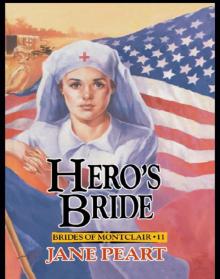 Hero's Bride
Hero's Bride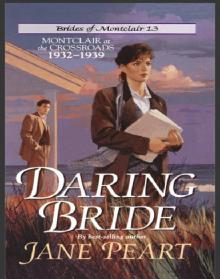 Daring Bride
Daring Bride Runaway Heart
Runaway Heart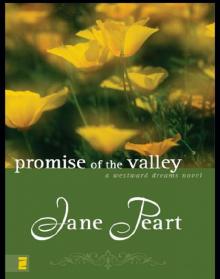 Promise of the Valley
Promise of the Valley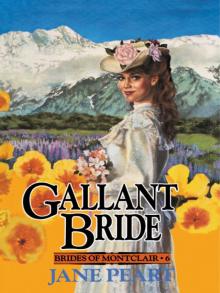 Gallant Bride
Gallant Bride The Pledge, Value
The Pledge, Value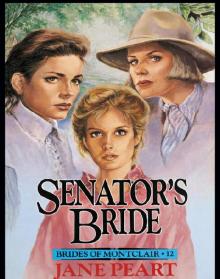 Senator's Bride
Senator's Bride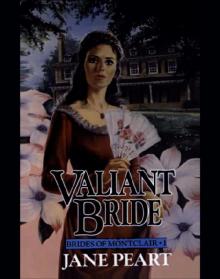 Valiant Bride
Valiant Bride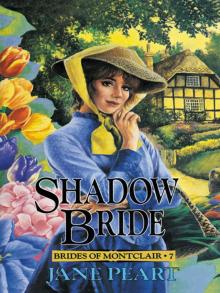 Shadow Bride
Shadow Bride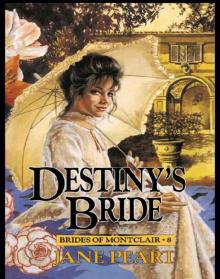 Destiny's Bride
Destiny's Bride A Tangled Web
A Tangled Web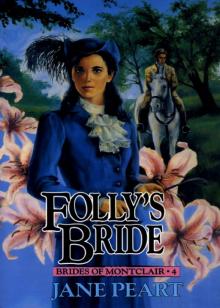 Folly's Bride
Folly's Bride The Promise
The Promise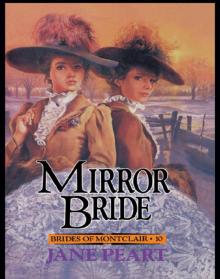 Mirror Bride
Mirror Bride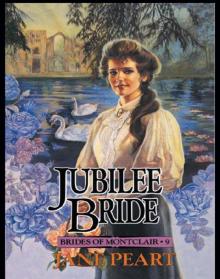 Jubilee Bride
Jubilee Bride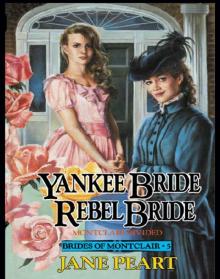 Yankee Bride / Rebel Bride
Yankee Bride / Rebel Bride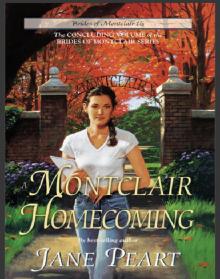 A Montclair Homecoming
A Montclair Homecoming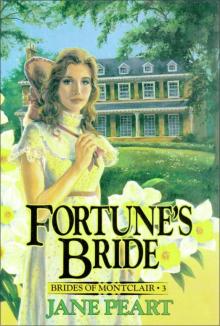 Fortune's Bride
Fortune's Bride Undaunted Spirit
Undaunted Spirit Love Takes Flight
Love Takes Flight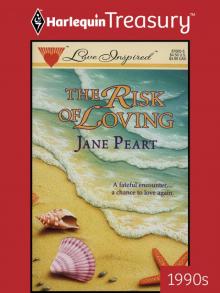 The Risk of Loving
The Risk of Loving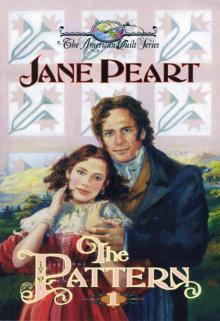 The Pattern
The Pattern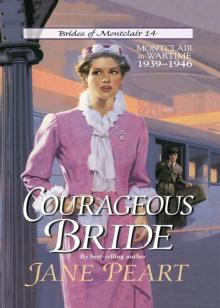 Courageous Bride
Courageous Bride